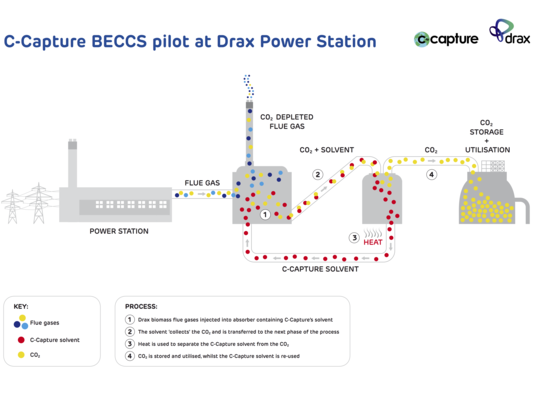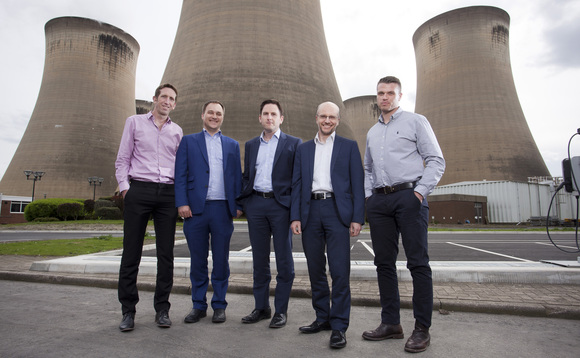Drax to Test Carbon Capture Technology at Europe Biomass Plant

By Michael Holder
May 21, 2018 - Drax is set to pilot Europe's first biomass carbon capture and storage (CCS) project, having today announced a partnership with CCS specialists from the University of Leeds to pilot "new technology" at its North Yorkshire power plant.
In a major boost for both CO2 capture development and hopes that a negative emissions industry could one day play a key role in a net zero emission economy, the energy firm said it was partnering with C-Capture - a spin out from the University of Leeds - to invest £400,000 in "what could be the first of several pilot projects" at Drax to deliver "rapid, low cost demonstration of BECCS" (bioenergy CCS).
If successful, the companies said it could make the electricity produced from the biomass units at Drax Power Station carbon negative, by removing more CO2 from the atmosphere than the facility creates from the process of sourcing and burning wood pellets.
Will Gardiner, CEO of Drax Group, said that in order to achieve the global climate targets set out in the Paris Agreement negative emissions were a "must", and that BECCS would prove a leading technology in helping to achieve that aim.
"This pilot is the UK's first step, but it won't be the only one at Drax," said Gardiner. "We will soon have four operational biomass units, which provide us with a great opportunity to test different technologies that could allow Drax, the country and the world, to deliver negative emissions and start to reduce the amount of carbon dioxide in the atmosphere."
Drax Power Station is the UK's largest, with three of its units operating to use biomass wood pellets as a fuel source after being converted from coal over the past decade. The other three units still run on coal, although the company recently said it would convert a fourth unit to biomass in 2018.
The first phase of the BECCS project announced today will begin this month, the firm explained, and will examine whether a solvent developed by C-Capture is compatible with the biomass flue gas at the North Yorkshire plant.
A lab-scale study into the feasibility of utilizng the flue gas desulphurization (FGD) absorbers at the power station will also be carried out to assess potential capture rates, it said. Depending on the outcome of that study, the C-Capture team then plan to proceed to the second stage of the pilot in the autumn, which will see a demonstration unit installed to isolate the carbon dioxide produced by the biomass combustion.
It is not the first CCS project Drax has been involved in, having had to pull the plug on a previous scheme for coal units at the plant after the then-Chancellor George Osborne axed the government's flagship £1bn CCS development competition in 2015 - a move which has since been criticised by government watchdogs as short sighted.
Since then, however, the government has signaled a renewed interest in developing CCS as part of its Clean Growth Strategy - albeit at a much smaller scale in terms of state funding - and energy and clean growth minister Claire Perry hailed today's news as "hugely exciting".
"We aim to make the UK a world leader in carbon capture usage and storage, a key part of our modern Industrial Strategy," the minister said in a statement. "It's hugely exciting that Drax has chosen to invest in this innovative project, demonstrating how government support for innovation can create an environment where companies can develop new technologies and scale up investment to build the sectors we will need to achieve long term decarbonization."
Unlike Drax's previous CCS projects, the firm said the BECCS project was an early pilot for new technology that would examine the potential for a new form of carbon capture after combustion from biomass power generation, rather than coal.

Image by Drax
Unlike coal, biomass generation uses wood pellets which naturally sequester carbon, meaning capturing and storing or utilising the carbon dioxide that results from burning wood pellets can potentially result in the net removal of CO2 from the atmosphere at the same time as producing electricity.
Drax highlighted a 2016 report by the Energy Technology Institute which suggested that by the 2050s BECCS could deliver roughly 55 million tonnes of net negative emissions a year in the UK, which equate to approximately half of the nation's emissions reduction target.
The technology is regarded as critical to global decarbonization efforts by some experts, who argue that with some emissions from sectors like industry and aviation likely to continue deep into the second half of the century negative emissions technologies will be key to meeting the Paris Agreement goal of building a net zero emission economy. The UK, the EU, and a number of other countries are currently considering formal net zero emission targets and BECCS technology is seen as having a key role to play in meeting any new goals.
Chris Rayner, founder of C-Capture and Professor of Organic Chemistry at the University of Leeds, said his firm had developed "fundamentally new chemistry" which he said was suitable for capturing the carbon produced from bioenergy processes.
"The key part is now to move it from our own facilities and into the real world at Drax," Rayner explained. "Through the pilot scheme we aim to demonstrate that the technology we've developed is a cost-effective way to achieve one of the holy grails of CO2 emissions strategies - negative emissions in power production, which is where we believe the potential CO2 emissions reductions are likely to be the greatest."
The marks another steop forward for the still nascent global CCS sector, after the Norwegian government last week announced further funding in support of plans to deliver a fully operational carbon capture, transport, and storage chain by 2022.
Dr. Luke Warren, chief executive of UK trade body the Carbon Capture and Storage Association (CCSA), said the Drax project marked an "important step forward" for the technology and the prospects of delivering negative emissions. "It is clear that negative emissions are likely to be needed if we are to deliver on UK and global climate change goals," he said. "The UK government is currently developing a CCUS Deployment Pathway, which is due to be published by the end of this year. It will be important to ensure that BECCS is part of this pathway alongside the development of CCUS to reduce existing emissions from industry, heat, power and transport."
With three coal units still in operation, Drax Power Station remains one of the UK's single biggest contributors to greenhouse gases, while its reliance on biomass has drawn criticism from some green groups who question the sustainability credentials of wood-based feedstocks. However, with negative emissions technologies likely to have a critical role to play if the world is to meet the goals agreed to in the Paris Agreement this trial could represent a globaly significant breakthrough.
It remains to be seen whether the BECCS pilot proves successful. But if it does, it may spur the company - and other operators around the world - to turn the coal plants that helped drive the climate crisis into the negative emissions facilities that must just play a key role in resolving it.

(L-R) Jason Shipstone, head of R&D at Drax Group; Caspar Schoolderman, director of engineering at C-Capture; Andy Koss, CEO Drax Power; Prof. Christopher Rayner, technical director at C-Capture; Carl Clayton, research and innovation engineer at Drax Group.
Photo by Drax

